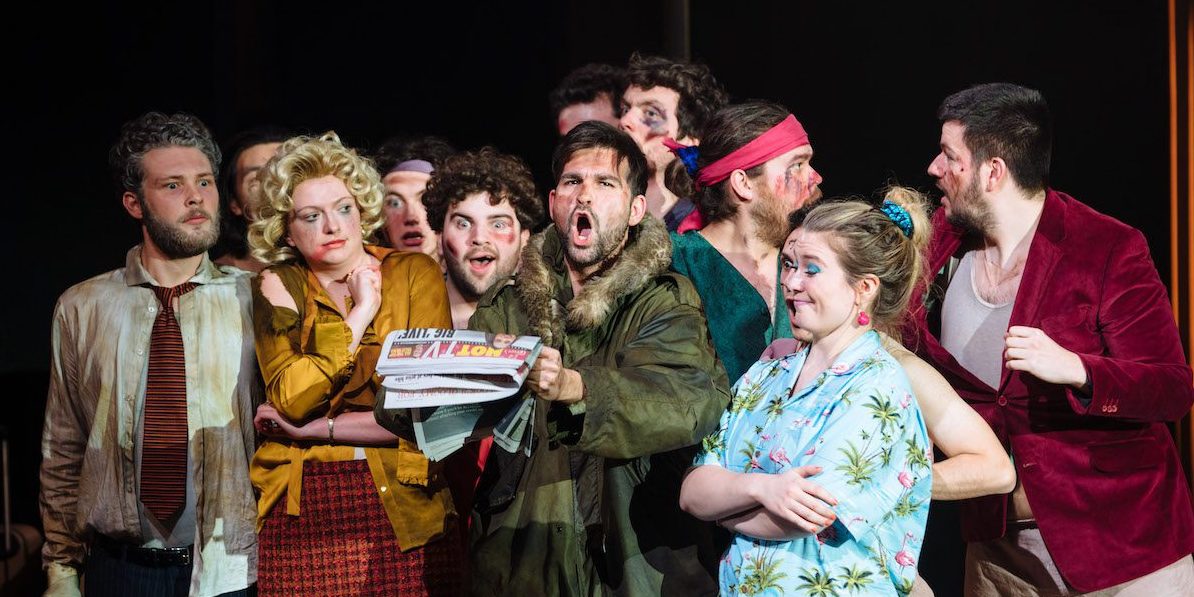There are obvious attractions behind offering a double-bill for the Spring opera slot at the Guildhall: a variety of mood and the fullest spectrum of opportunities for student performers and creative team, all coordinated by experienced professionals. There is no deeper connection between the two operas performed here, but their exploration of different kinds of alienation from modernity provides a fig-leaf; and, more importantly, the remarkably flexible and inventive set designed by Anna Reid ensures the one flows into the other with the minimum of delay and rearrangement.
‘The Telephone’ is charming if slight, work of under half an hour which gives a showcase opportunity for a soprano to show off her technique. This is something Segomotso Shupinyaneng does with flair in the role of the girlfriend who is as much in love with her telephone as she is with her boyfriend, who is on the verge of a proposal. Given modern preoccupations with devices, this is a 1940s opera that is easy to update, and here we find ourselves in the showroom of an apartment block with Lucie as the selling agent, and her beau, well sung and acted by the long-suffering Jonathan Eyers, needing to catch a train. Finally, he twigs that it is easier to square the circle and propose over the phone instead. A modern parable indeed!
However, Judith Weir’s ‘Miss Fortune’ is much more substantial in every way – length, musical depth, and layered messaging. It also receives quite an outstanding performance from the cast and creative team. This is important beyond the performance itself because when this work appeared a decade ago it was weighted down at Covent Garden with an unsuitable production that served to blunt the impact of what should now be seen as one of this composer’s major works. There are attractive melodies, truly sophisticated writing for soloists and chorus, delectable percussive textures in the orchestra, and above all a secure dramatic sense that makes this piece a compelling theatre work that should be seen more often. It is also a great piece to showcase student talent thanks to the even-handed distribution of fine character roles for both men and women, lots of orchestra colour to develop, and major parts for male and female chorus – something for everyone, in fact, very much in the tradition of Britten and Tippett whose musical voices can be heard echoed here.
The story is adapted from a Sicilian morality tale in which a family shifts suddenly from riches to poverty, and the daughter, Tina, must shift for herself and learn to adapt first to working in a garment factory, assisting a street vendor, and working in a laundrette. Eventually, she realises he has to confront Fate (himself a character) before a reversal of fortune takes place and she finds a possible husband and happy ending for the wider community, as much as herself. The tone is sparky and humorous, though punctuated by thoughtful projections of darkness and empathy for the unfortunate.
The writing is demanding of the voices and the cast rise impressively to its challenges. In the lead role, Erin Gwynn Rossington finds richness and generosity of tone that match the open-heartedness of her character. Alongside her, the insistently malevolent Fate of Kieron Connor Valentine reminds us of the more implacable moments of his recent portrayal of Oberon, but with new maturity of acting craft. Like Hassan, the much put-upon street vendor, Florian Panzieri, finds a memorable heroic tenor; and he is well-matched with the long-suffering laundrette manager, Donna, sung and acted with powerful conviction and cheeky street wisdom by Laura Fleur. Alongside the leads, the choruses are exceptional for their vocal incisiveness and plausible, dynamic stage movement, which lend weight to the sense of the show as a community experience.
In the pit Dominic Wheeler maintains the balance of forces keenly so that the singers and the many words of the text can be heard while giving the orchestra its head in the several interludes that cover scene changes. Again, credit should go to Anna Reid for a series of detailed interior sets that are slid neatly in and out seamlessly. The opera benefits from a modified naturalism that gives you a keen sense of place but also split levels on which the action can develop. Lighting designs too, from Anthony Doran, underscore mood effectively and the costumes contrast garish opulence and ragged destitution with detailed precision focused on significant hats or garments that speak volumes.
So far from being a production that just provides a convenient student vehicle, director Martin Lloyd-Evans has marshalled a production that should serve to enhance and embed the reputation of the opera itself. So do grab a ticket if you can, or watch it later in the month when streamed.

